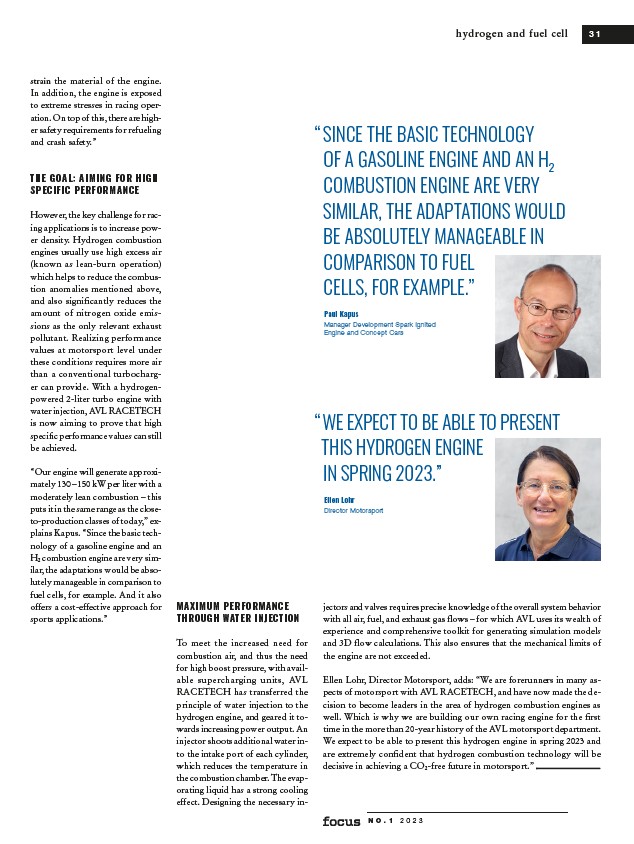
hydrogen and fuel cell 3 1
SINCE THE BASIC TECHNOLOGY
OF A GASOLINE ENGINE AND AN H2
COMBUSTION ENGINE ARE VERY
SIMILAR, THE ADAPTATIONS WOULD
BE ABSOLUTELY MANAGEABLE IN
COMPARISON TO FUEL
CELLS, FOR EXAMPLE.”
Paul Kapus
Manager Development Spark Ignited
Engine and Concept Cars
N O . 1 2 0 2 3
“
WE EXPECT TO BE ABLE TO PRESENT
THIS HYDROGEN ENGINE
IN SPRING 2023.”
Ellen Lohr
Director Motorsport
“
strain the material of the engine.
In addition, the engine is exposed
to extreme stresses in racing operation.
On top of this, there are higher
safety requirements for refueling
and crash safety.”
THE GOAL: AIMING FOR HIGH
SPECIFIC PERFORMANCE
However, the key challenge for racing
applications is to increase power
density. Hydrogen combustion
engines usually use high excess air
(known as lean-burn operation)
which helps to reduce the combustion
anomalies mentioned above,
and also significantly reduces the
amount of nitrogen oxide emissions
as the only relevant exhaust
pollutant. Realizing performance
values at motorsport level under
these conditions requires more air
than a conventional turbocharger
can provide. With a hydrogenpowered
2-liter turbo engine with
water injection, AVL RACETECH
is now aiming to prove that high
specific performance values can still
be achieved.
“Our engine will generate approximately
130 – 150 kW per liter with a
moderately lean combustion – this
puts it in the same range as the closeto
production classes of today,” explains
Kapus. “Since the basic
technology
of a gasoline engine and an
H2 combustion engine are very similar,
the adaptations would be absolutely
manageable in comparison to
fuel cells, for example. And it also
offers a cost-effective approach for
sports applications.”
MAXIMUM PERFORMANCE
THROUGH WATER INJECTION
To meet the increased need for
combustion air, and thus the need
for high boost pressure, with available
supercharging units, AVL
RACETECH has transferred the
principle of water injection to the
hydrogen engine, and geared it towards
increasing power output. An
injector shoots additional
water into
the intake port of each cylinder,
which reduces the temperature in
the combustion chamber. The evaporating
liquid has a strong cooling
effect. Designing the necessary injectors
and valves requires precise knowledge of the overall system behavior
with all air, fuel, and exhaust gas flows – for which AVL uses its wealth of
experience and comprehensive toolkit for generating simulation models
and 3D flow calculations. This also ensures that the mechanical limits of
the engine
are not exceeded.
Ellen Lohr, Director Motorsport, adds: “We are forerunners in many
aspects
of motorsport with AVL RACETECH, and have now made the decision
to become leaders in the area of hydrogen combustion engines as
well. Which is why we are building our own racing engine for the first
time in the more than 20-year history of the AVL motorsport department.
We expect to be able to present this hydrogen engine in spring 2023 and
are extremely confident that hydrogen combustion technology will be
decisive
in achieving a CO2-free future in motorsport.” �